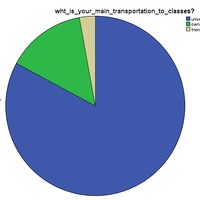•
Mobile technologies offer more than just calling. There are number of innovative features that are crucial and impactful to educational purpose. Despite the importance of understanding factors influencing mobile technologies for learning,... more
Mobile technologies offer more than just calling. There are number of innovative features that are crucial
and impactful to educational purpose. Despite the importance of understanding factors influencing mobile
technologies for learning, this area has received limited research. Thus, the aim of this study is to
investigate factors influencing intention to use m-learning among students at Malaysian technical
universities. The research framework for this research has been adopted from unified theory of
acceptance and use of technology (UTAUT) to achieve research objectives. A total of 400 set of data was
collected from four Malaysia technical universities using purposeful structured random sampling and
self-administrated survey questionnaire. AMOS was performed to test whether the model of its good fit to
test hypotheses formulated. The results revealed that performance expectancy and self-management of
learning are significant related to behavioral intention to use m-learning while effort expectancy, social
influence and perceived playfulness do not indicate significant relationship with intention to use mobile
technologies for learning among students at Malaysia technical universities. The findings of this study
added new understanding as regard to factors influencing students' intention to use m-learning in higher
education.
Authors: Ng Kim-Soon, Mohamud Ahmed Ibrahim, Abd Rahman Ahmad, Ng Mei Xin Sirisa
and impactful to educational purpose. Despite the importance of understanding factors influencing mobile
technologies for learning, this area has received limited research. Thus, the aim of this study is to
investigate factors influencing intention to use m-learning among students at Malaysian technical
universities. The research framework for this research has been adopted from unified theory of
acceptance and use of technology (UTAUT) to achieve research objectives. A total of 400 set of data was
collected from four Malaysia technical universities using purposeful structured random sampling and
self-administrated survey questionnaire. AMOS was performed to test whether the model of its good fit to
test hypotheses formulated. The results revealed that performance expectancy and self-management of
learning are significant related to behavioral intention to use m-learning while effort expectancy, social
influence and perceived playfulness do not indicate significant relationship with intention to use mobile
technologies for learning among students at Malaysia technical universities. The findings of this study
added new understanding as regard to factors influencing students' intention to use m-learning in higher
education.
Authors: Ng Kim-Soon, Mohamud Ahmed Ibrahim, Abd Rahman Ahmad, Ng Mei Xin Sirisa
